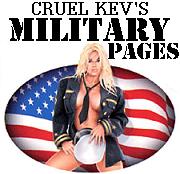Taxpayer Money Spent Funding Breast Enhancements For Sailors
 The Royal Australian Navy is paying for women sailors to have breast enlargements for purely cosmetic reasons, at a cost to taxpayers of $10,000 an operation. Defence officials claim the surgery is justified because some servicewomen need bigger breasts to address "psychological issues". Darling Point plastic surgeon Kourosh Tavakoli told The Sunday Telegraph the navy had paid for two officers, aged 25 and 32, to have breast-augmentation surgery at his private clinic. Dr Tavakoli said the women had not been injured but claimed to suffer "psychological" problems. "I've had two female officers who have got the navy to pay for breast augmentation for psychological reasons," he said. "I know for a fact two patients claimed it back on the navy. They (the navy) knew it was breast augmentation and paid for it. "I don't know why they pay for it. There's no breast augmentation, that I know of, for medical purposes. You've got to be fair to yourself."
The Royal Australian Navy is paying for women sailors to have breast enlargements for purely cosmetic reasons, at a cost to taxpayers of $10,000 an operation. Defence officials claim the surgery is justified because some servicewomen need bigger breasts to address "psychological issues". Darling Point plastic surgeon Kourosh Tavakoli told The Sunday Telegraph the navy had paid for two officers, aged 25 and 32, to have breast-augmentation surgery at his private clinic. Dr Tavakoli said the women had not been injured but claimed to suffer "psychological" problems. "I've had two female officers who have got the navy to pay for breast augmentation for psychological reasons," he said. "I know for a fact two patients claimed it back on the navy. They (the navy) knew it was breast augmentation and paid for it. "I don't know why they pay for it. There's no breast augmentation, that I know of, for medical purposes. You've got to be fair to yourself."
A Defence spokesman admitted cosmetic surgery occurred at "public expense" when there were "compelling psychological/psychiatric reasons", but refused to say how many such cases were taxpayer-funded. Cosmetic surgery was also provided for servicemen or women who were disfigured by work-related injuries, he said. "Cosmetic procedures undertaken solely for the purpose of preserving or improving a person's subjective appearance will be considered only if the underlying (psychological) problem is causing difficulties that adversely impact on the member's ability to do their job. "Operations purely for cosmetic reasons are not allowed." The Sunday Telegraph asked Defence Minister Brendan Nelson, formerly a GP, how many members of the armed forces had received taxpayer-funded cosmetic surgery. A spokesman said figures would not be available until next week. Australian Defence Association spokesman Neil James defended the practice of taxpayers funding medical procedures such as breast enhancement surgery for psychological reasons. He said young men and women were attracted to defence careers because they offered free medical care. This, in turn, improved the efficiency of the force.
 "Just as there are in civilian life, there are some females who feel their breasts are too small and if their breasts were bigger, they might be more of a 'normal' woman," Mr James said. "If they were lacking in self-confidence, this might provide the measure of self-confidence that would help them tackle their wider job. "There are privacy issues here for people. It's not as if they keep a record of who has had a nose job in the Defence Force over the past 100 years." Dr Tavakoli, a member of the Australian Society of Plastic Surgeons, said the navy officers had visited him in 2005 and 2006. Each had had $10,000 worth of surgery, which required a recovery period of at least two weeks. Boosting self-esteem was the biggest motivation for cosmetic surgery, Dr Tavakoli said. The Sunday Telegraph understands Dr Tavakoli is not the usual surgeon used by the navy for reconstructive/cosmetic surgery. "I don't see a lot of them (naval officers) because they have their own plastic surgeon," he said. "I know for a fact they have their own surgeon." Last year, a Brisbane surgeon revealed that an army cook had had a taxpayer-funded nose job.
"Just as there are in civilian life, there are some females who feel their breasts are too small and if their breasts were bigger, they might be more of a 'normal' woman," Mr James said. "If they were lacking in self-confidence, this might provide the measure of self-confidence that would help them tackle their wider job. "There are privacy issues here for people. It's not as if they keep a record of who has had a nose job in the Defence Force over the past 100 years." Dr Tavakoli, a member of the Australian Society of Plastic Surgeons, said the navy officers had visited him in 2005 and 2006. Each had had $10,000 worth of surgery, which required a recovery period of at least two weeks. Boosting self-esteem was the biggest motivation for cosmetic surgery, Dr Tavakoli said. The Sunday Telegraph understands Dr Tavakoli is not the usual surgeon used by the navy for reconstructive/cosmetic surgery. "I don't see a lot of them (naval officers) because they have their own plastic surgeon," he said. "I know for a fact they have their own surgeon." Last year, a Brisbane surgeon revealed that an army cook had had a taxpayer-funded nose job.



















<< Home